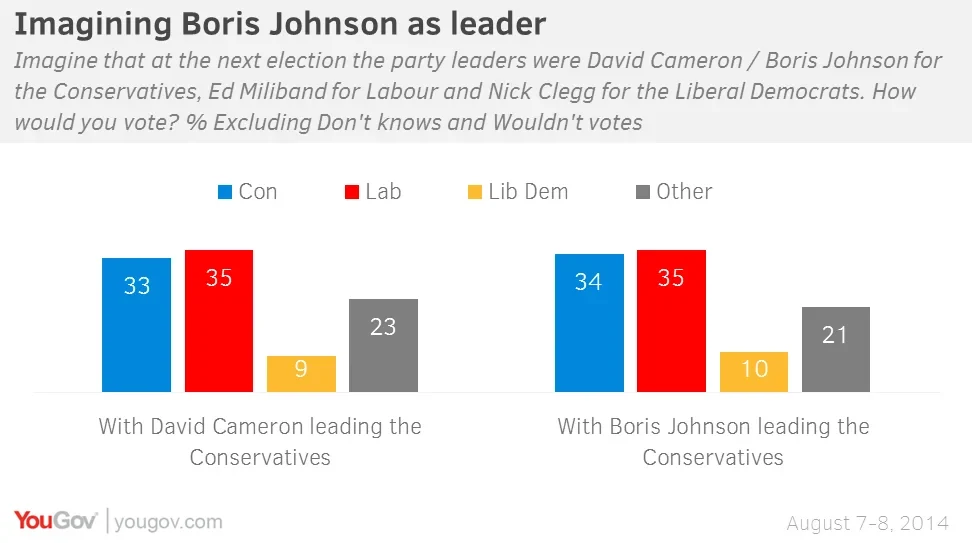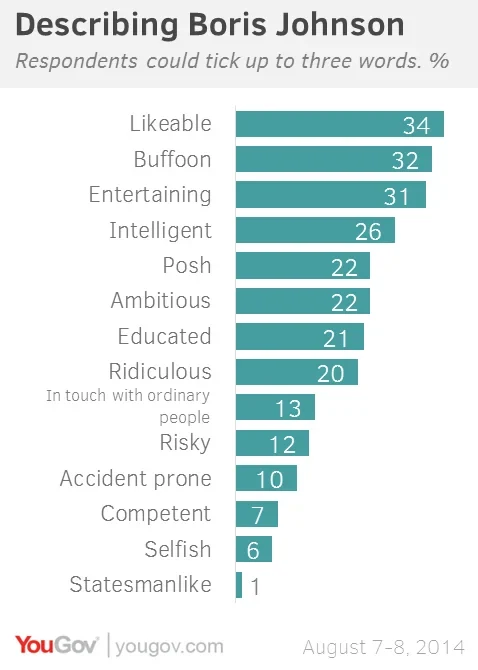A theoretical Boris Johnson-led Conservative party gains the support of some UKIP voters, but loses other Conservatives
London Mayor Boris Johnson intends to stand for Parliament in the next election, he has announced. The politician, who has been mayor of the UK capital since 2008 and was formerly a Conservative MP, has not found a seat to run in yet, but the announcement immediately inflamed longstanding speculation that he will attempt to succeed David Cameron as leader of the party.
A new YouGov poll for the Sunday Times finds that, when people are asked to speculate how they would vote if Boris Johnson was leader of the Conservatives, the final numbers are almost unchanged from current totals.
Excluding Don’t knows and Wouldn’t votes, Labour have a narrow two-point lead over the Conservatives in voting intention when the question is framed as a choice between the Conservatives led by David Cameron, Labour led by Ed Miliband and the Lib Dems led by Nick Clegg (the usual voting intention question, on which Labour have a four-point lead, does not mention the leaders).

Excluding the 5% who Don't know or Wouldn't vote in the new scenario, one in five UKIP voters say they would vote for the Conservatives if Mr Johnson was the leader of the party and both Ed Miliband and Nick Clegg remained as leaders of theirs. Only 3% of UKIP voters would vote for David Cameron. However, some of Conservative voters would move away from a Boris-led Tory Party.
Although it is a purely theoretical exercise, the poll suggests that in pure brand value terms, having Boris Johnson as leader of the Conservatives would not fundamentally change the race at this time. The mayor’s broad-based popularity in the capital – most Londoners say he is doing well, including nearly half of Labour voters – suggests he could have some crossover appeal nationally, drawing back 2010 Conservative voters who have since defected to UKIP, but also some Labour supporters. He does win the support of more 2010 Conservatives and Londoners than David Cameron – but only by small margins, and the vast majority of Labour and Lib Dem voters stick with their party whoever is leading the Conservatives.
Beyond voting intention
By 48% to 25% voters say he is right, not wrong, to return to Parliament, and a majority inside and outside of the capital say he can run for Parliament while still being mayor of London. He is also the top choice among Conservatives to be David Cameron’s successor, winning the support of 41% and defeating the runner-up, Home Secretary Theresa May, by a commanding 26-point margin.
However, most voters do not want him to remain Mayor if he wins a seat in Parliament. The vast majority (80%) of Conservative voters want David Cameron to remain leader of the party for at least another five years if the Conservatives win the next election – 56% want him to remain in the role even if they lose. Boris Johnson is seen as “up to the job of Prime Minister” by 36% of voters – more than Ed Miliband (24%) – but behind David Cameron (52%).

The adjectives voters use to describe him (selected from a list) highlight the paradox presented by Mr Johnson’s image. 34% describe him as likeable (including 19% of Labour voters), but 32% see him as a buffoon (including 20% of Conservatives). Few see him as risky (12%), yet fewer see him as competent (7%); just 13% see him as in touch with ordinary people. That’s more than twice the 5% who recently said David Cameron is “in touch”, but it’s lower than the 21% who said so for Ed Miliband, and lower than the numbers David Cameron received on this measure between 2007 and October 2010 (around 16%-20%).
Image: PA






